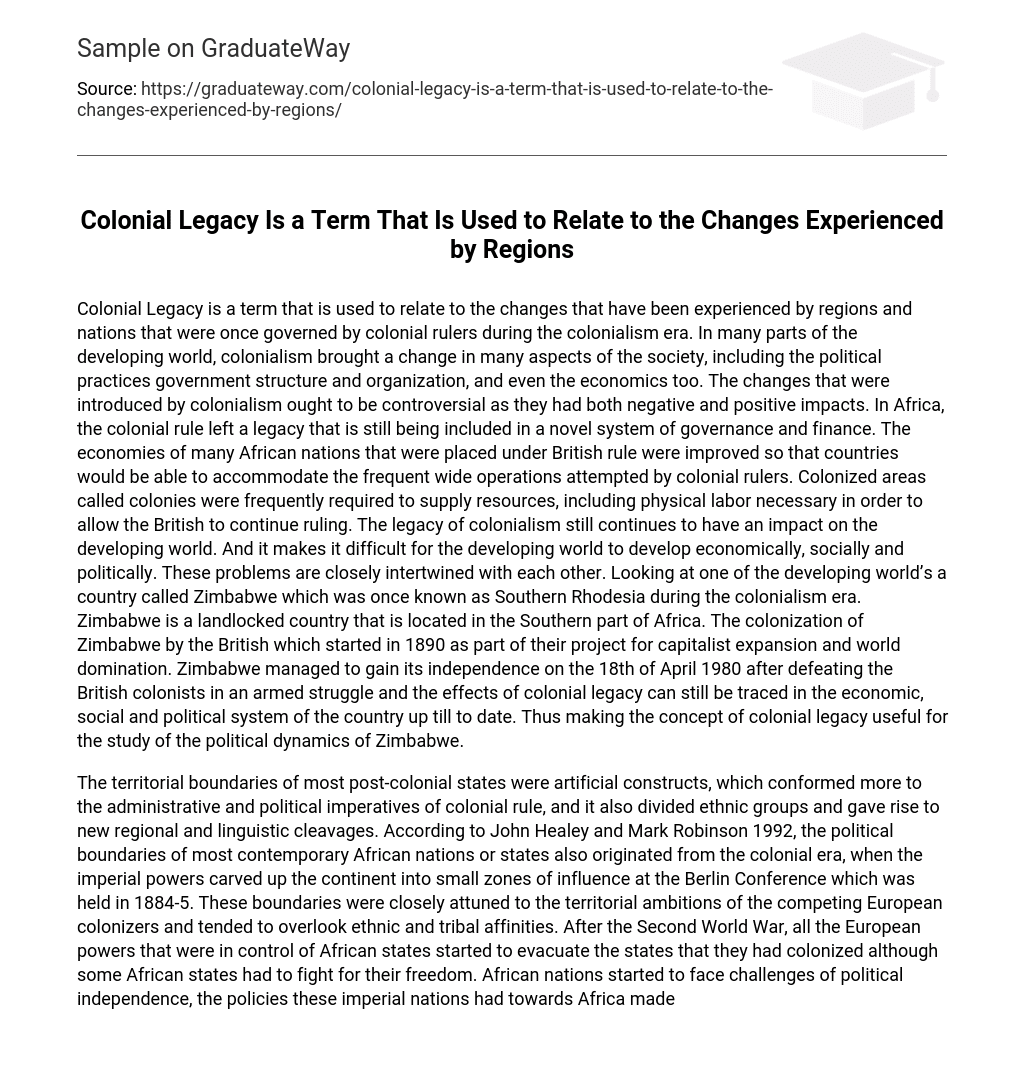Colonial Legacy is a term that is used to relate to the changes that have been experienced by regions and nations that were once governed by colonial rulers during the colonialism era. In many parts of the developing world, colonialism brought a change in many aspects of the society, including the political practices government structure and organization, and even the economics too. The changes that were introduced by colonialism ought to be controversial as they had both negative and positive impacts. In Africa, the colonial rule left a legacy that is still being included in a novel system of governance and finance. The economies of many African nations that were placed under British rule were improved so that countries would be able to accommodate the frequent wide operations attempted by colonial rulers. Colonized areas called colonies were frequently required to supply resources, including physical labor necessary in order to allow the British to continue ruling. The legacy of colonialism still continues to have an impact on the developing world. And it makes it difficult for the developing world to develop economically, socially and politically. These problems are closely intertwined with each other. Looking at one of the developing world’s a country called Zimbabwe which was once known as Southern Rhodesia during the colonialism era. Zimbabwe is a landlocked country that is located in the Southern part of Africa. The colonization of Zimbabwe by the British which started in 1890 as part of their project for capitalist expansion and world domination. Zimbabwe managed to gain its independence on the 18th of April 1980 after defeating the British colonists in an armed struggle and the effects of colonial legacy can still be traced in the economic, social and political system of the country up till to date. Thus making the concept of colonial legacy useful for the study of the political dynamics of Zimbabwe.
The territorial boundaries of most post-colonial states were artificial constructs, which conformed more to the administrative and political imperatives of colonial rule, and it also divided ethnic groups and gave rise to new regional and linguistic cleavages. According to John Healey and Mark Robinson 1992, the political boundaries of most contemporary African nations or states also originated from the colonial era, when the imperial powers carved up the continent into small zones of influence at the Berlin Conference which was held in 1884-5. These boundaries were closely attuned to the territorial ambitions of the competing European colonizers and tended to overlook ethnic and tribal affinities. After the Second World War, all the European powers that were in control of African states started to evacuate the states that they had colonized although some African states had to fight for their freedom. African nations started to face challenges of political independence, the policies these imperial nations had towards Africa made it very challenging for the states to have a strong start. To begin with the issue of the boundaries that were drawn In Africa by colonists they were mainly drawn for economic benefits of Europeans. Since during that time Industrialization had started to take place in Europe and raw materials were needed from the African continent. The legacy of colonialism in the Sub Saharan Africa is still part of geo politics today. The current boundaries on Africa’s political map is very much of a result of colonialism were European powers redrew political boundaries without any concern for ethnic or tribal tensions. Although these modern nations could work out their own borders, this part of colonialism’s legacy has led to countless tensions within these countries today. A boundary dispute once occurred between Zimbabwe and Zambia over the boundary of Lake Kariba and the dispute was a security concern, whereby some Zambians had been arrested and prosecuted for crossing into the Zimbabwean waters on the lake. The Zambian’s government still demands to have the lake Kariba as their own without sharing it with Zimbabwe.
However the experience of liberal democracy in independent Africa proved to be short lived. Within a few years of achieving independence, the trend had shifted in favor of authoritarianism, with the elimination of political competition and the creation of one-party states either by constitutional fiat or by military take over. Modern Africa authoritarianism is characterized by the removal of the constitutional rights and protection from the political opponents, the elimination of institutional checks and balances, and the centralization and concentration of state power in presidential offices as well as the termination of open party politics and the regulation and containment of political participation usually within the framework of a single ruling party. Autocratic or dictatorial rulers tend to resort to coercive methods to enforce compliance, while in the more open oligarchies in combination of these measures was employed. Diamond 1988a:13, places some of the blame for democratic failure on the shoulders of the political leadership, the majority of whom, he argues, were only weakly committed to liberal democracy. He draws attention to the ease that the nationalist leaders were prone to abuse power and ignore basic democratic norms and procedures. He infers that most leaders upheld democratic conventions during the period of decolonization as a means to achieve independence rather than as a guide to political behavior in post-colonial period.





